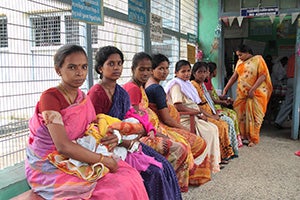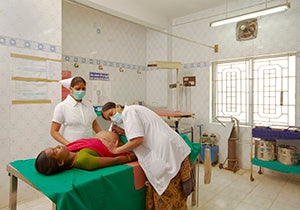 As fate would have it, Sriviliputtur Government Hospital (in Tamil Nadu’s Ramnathapuram district) happened to be one of the first hospitals he reviewed on taking charge. An officer on Pankaj Kumar Bansal’s team drew his attention to a heavily pregnant lady, who was close to panic stricken tears on being referred out, yet again, to another government hospital for emergency obstetric care. That Sriviliputtur itself was a designated CEmONC center (Comprehensive Emergency Obstetric and Neonatal Care Center) mandated to provide every conceivable (except for the very super-specialized) care required for a pregnant mother and her neonate, and yet was incapable of handling the emergency, distressed him deeply.
As fate would have it, Sriviliputtur Government Hospital (in Tamil Nadu’s Ramnathapuram district) happened to be one of the first hospitals he reviewed on taking charge. An officer on Pankaj Kumar Bansal’s team drew his attention to a heavily pregnant lady, who was close to panic stricken tears on being referred out, yet again, to another government hospital for emergency obstetric care. That Sriviliputtur itself was a designated CEmONC center (Comprehensive Emergency Obstetric and Neonatal Care Center) mandated to provide every conceivable (except for the very super-specialized) care required for a pregnant mother and her neonate, and yet was incapable of handling the emergency, distressed him deeply.
Were designated CEmONC centers not equipped, staffed or enabled enough? Were pregnant women being referred out from other centers as well? Were the reasons for referral genuine or flippant? And what were the consequences for this hapless mother and her baby? Pankaj began to seek answers. What followed were rigorous weekly field visits, undertaken by his team and himself, across the length and breadth of Tamil Nadu. Wherever CEmONCS were found lacking in infrastructure, the gaps were filled on priority. Staffing with a full complement of doctors—4 obstetricians, 4 gynecologists, and 2 anesthetists at each CEmONC center was a challenge. He encouraged, counseled and moved doctors around to ensure CEmONCS were functional around the clock. Every maternal and neonatal death was audited and the findings shared in monthly review meetings with senior district and state health officials. Decisions were taken immediately to resolve the issues responsible for an avoidable death. Some decisions were popular, and some weren’t.
What followed were rigorous weekly field visits, undertaken by his team and himself, across the length and breadth of Tamil Nadu. Wherever CEmONCS were found lacking in infrastructure, the gaps were filled on priority. Staffing with a full complement of doctors—4 obstetricians, 4 gynecologists, and 2 anesthetists at each CEmONC center was a challenge. He encouraged, counseled and moved doctors around to ensure CEmONCS were functional around the clock. Every maternal and neonatal death was audited and the findings shared in monthly review meetings with senior district and state health officials. Decisions were taken immediately to resolve the issues responsible for an avoidable death. Some decisions were popular, and some weren’t.
The weekly visits did take a toll. Bad backs, tennis elbows, a fractured foot, exhausted bodies—the team and he accrued these over two and a half years of unceasing effort. Was the effort worth it? It most certainly was. Almost all CEmONCS are now fully equipped and staffed and are capable of offering round the clock comprehensive care. Needless referrals from one hospital to another are minimized. Almost all mothers in the state (99.8%) are now delivering in health facilities; and over two-thirds of these take place in public health facilities. Over a period of 2.5 years, more than 500,000 mothers accessed CEmONCs to address complications during pregnancy and childbirth. CEmONCs are also offering equitable care; almost 45% of complicated deliveries at the centers are occurring amongst vulnerable groups (Scheduled Castes and Tribes). The number of maternal deaths had also fallen - from 85 per 100,000 live births in 2009-10 to 79 in 2012-13. Also, fewer infants are dying with the infant mortality rate having reduced from 31 per 1,000 live births to 22 during this time.
Perhaps there is no substitute for championing a cause with unfailing enthusiasm, for good old pounding the pavement, and providing supportive oversight. So many mothers and babies, who may not have made it through pregnancy, childbirth and early life, are safe today—thanks to the unceasing efforts of the deeply committed team at the Tamil Nadu Health Systems Project.


Join the Conversation